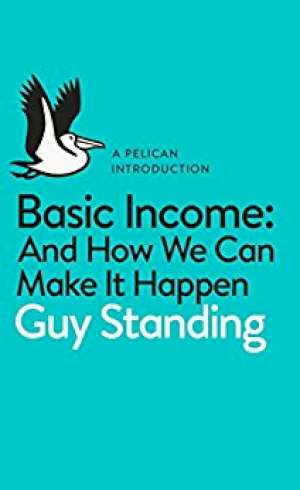13 July 2017
Basic Income
And how we can make it happen
Guy Standing
2017, Pelican, 400 pages,
ISBN 9780141985480
Reviewer: Simon Briscoe

Basic Income: Two introductions to a policy idea whose time may have come
This review is to be read in conjunction with
Basic Income: A Radical Proposal for a Free Society and a Sane Economy
It was a pleasure to read these two books. Having heard a fair bit about universal basic income (UBI) in recent months – mentioned by the Labour Party, promised by the Greens and cropping up in the French presidential election among other places – it was right to swot up. In these times of change, I was ready to see if UBI might be a runner.
As van Parijs and Vanderborght say, UBI, “… [U]sed to be regarded as the fantasy of a handful of lunatics,” but now offers, “[H]ope that we might yet achieve a free society and a sane economy.” There is a lot here, nearly 400 pages including a 50 page bibliography and 75 of notes. UBI is utopian, just like the abolition of slavery, free education and universal suffrage, they say, but the thoroughness of this work means that there are also crunchier chapters that look at the details of schemes. I suspect it is as good a reference book as any if you want to get beyond the populist headlines.
In contrast, the Standing book is shorter and an easier read. It covers the same ground with the same passion but is less academic in nature. It piles straight in with the view that, “Current economic and social policies are producing unsustainable inequalities and injustices,” and that, “Unless a new income distribution system can be constructed, the drift to the far right …… will only grow stronger.” But it also has a ‘How to get there from here’ section, some tips on running pilot schemes and some links to UBI-supporting bodies and further reading.
The vision for reducing economic inequality is honourable and there are clearly political, philosophical and practical arguments for and against UBI as the means to do that. But by the end I did feel that these authors were members of the same club. If you’re in the club the benefits of UBI are obvious.
Standing (bravely) lists a riposte to the ‘standard objections’. Unfortunately I found the objections quite convincing. Any one of them is perhaps not that important but taken together, I was a lost cause as a convert. In that sense UBI is quite binary, perhaps like Brexit, in that you are on one side or the other.
Mainly I was unconvinced because I was keen to see how much UBI might cost or benefit certain types of household. Alas the affordability chapters seem to spend more time explaining why the estimates of non-believers are wrong. (These mostly suggest that UBI would either be at such a low level that it would make little difference or, if it were set at a level that did make a difference, it would be impossible to introduce.)
I can see that higher earners would pay UBI back in tax and that there might be savings in the administration of benefits, but when the authors fall back on scrapping Trident or ‘ending subsidies that go predominantly to corporations and the affluent’ to make it work, I realised that I was not going to get a ready-reckoner.
Even though I do not think everyone should be dependent on the state for their income, the analysis in these books can play an important role in framing the course for political economy. The concept of a basic income is work in progress but perhaps also a beacon.
